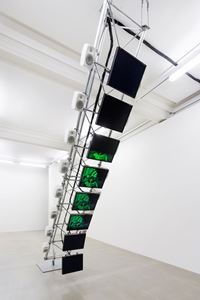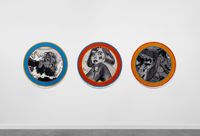


Marian Goodman Gallery is pleased to present a new exhibition of Dara Birnbaum, which centres around works from the 1990s that engage directly with political events, exploring legacies of dissent, and investigating the codes and gestures through which politics is lived. Spanning varied media, the works include a multi-channel installation, single-channel video, archival pigment prints, and UV prints on Duratrans. The exhibition takes up Birnbaum's longstanding interest in historical memory, public address, and the transmutability of images.
Transmission Tower: Sentinel (1992), first commissioned by documenta IX, and conceived in the immediate aftermath of the first Gulf War, uses the armature of telecommunication (the Rohn transmission tower) and juxtaposes three forms of political speech. Deploying two sections of a Rohn tower as the floor-to-ceiling scaffold for eight video monitors, through which images and sound juxtapose and rub against each other, the installation lays bare the deep imbrication of media and the military, entertainment and politics, visibility and the possibilities of protest.
The Rohn small television tower, invented in Peoria, Illinois in 1948, became the keystone of broadcasting infrastructure across the United States and a ubiquitous presence in military telecommunications worldwide. Like the steel lines forming the tower, the formulated video wall operates via verticals. Falling from one screen to the next is Birnbaum's recording of Beat poet Allen Ginsberg reading his anti-war poem Hum Bom! at the 1988 National Student Convention. Simultaneously, her footage of other scenes of student participants from this convention rise up the tower. The passion, idiosyncrasy, and relative chaos of these representations are in stark contrast to the tightly polished, controlled messaging of other video footage, in which President George H. W. Bush delivers his Thousand Points of Light speech at the Republican National Convention of the same year. A green wave pattern visually represents the measured rise and fall of his voice as the video drips downward from screen to screen. With thanks to Ania Szremski. Text excerpted from Dara Birnbaum: Reaction, CCS Bard Hessel Museum, June 25 – November 27, 2022
Antenna/Fist' __(1992), is a series of seventeen prints which appropriate imagery from street posters made in the fervency of May 1968 in France, when student revolution planted the seeds for a state-wide general strike. Collectively produced and widely dispersed, the street displayed posters were created by a collective of artists based at the occupied École des Beaux-Arts. With their iconography – the raised fist of the revolutionary, the blocky silhouette of a spiked antenna – they are an expression of the counterculture of the period, and carry the ferment of idealism, rebellion, and rejection of the status quo that permeated French society and marked the second half of the 20th century.
These messages of protest are juxtaposted with the single-channel video Canon: Taking to the Streets, (1990). Composed of archival footage of the 1987 Take Back the Night demonstration at Princeton University, the work abstractly depicts the march through the campus to sites where acts of sexual violence occurred. Shot by students with a low-grade VHS camera, the work simultaneously portrays the highly personal and emotive accounts of assault with an encounter with males from fraternity-type houses jeering at the demonstrators.
The pathos of popular imagery is crystallized in Quiet Disaster (1999), a trio of circular Duratrans prints on Plexiglas panels. Birnbaum utilised three specifically cropped and enlarged anime drawings portraying the reactions of characters in danger that emphasise a look of fear. To create these works, Birnbaum examined elemental disasters portrayed through comic and anime from different countries and cultures, showcasing this universal gesture within individual expression.
Dara Birnbaum was born in New York City, in 1946, where she continues to live and work. She received a Bachelor of Architecture degree from Carnegie Mellon University, Pittsburg, a B.F.A. in Painting from the San Francisco Art Institute, and a Certificate in Video and Electronic Editing at the Video Study Center at the New School for Social Research, New York. Birnbaum's work has been widely exhibited, at venues including: Tai Kwun, Hong Kong (2023), the Fondazione Prada Osservatorio, Milan (2023); Prada Aoyama, Tokyo (2023); Museum of Modern Art, New York (2023; also 2008), MoMA PS1, New York (2019); National Portrait Gallery, London (2018); Cleveland Museum of Art, Ohio (2018), among many others.
Major retrospectives and surveys of her work have been presented at the Hessel Museum of Art, Annandale- On-Hudson, New York (2022); Miller Institute of Contemporary Art, Pittsburgh (2022); Museu de Arte Contemporånea de Serralves, Porto, Portugal (2010) and S.M.A.K. Stedelijk Museum voor Actuele Kunst, Gent, Belgium (2009). Her work was exhibited in Documenta 7, 8, and 9.
Birnbaum has been the recipient of various distinguished awards, such as: John Simon Guggenheim Memorial Foundation Fellowship (2021); The Rockefeller Foundation Bellagio Center Arts Residency (2011); the Pollock-Krasner Foundation Grant (2011); and the prestigious United States Artists Fellowship (2010). She is the first woman in video to receive the prestigious Maya Deren Award by the American Film Institute, in 1987. In February 2017, Carnegie Mellon University's School of Art created The Birnbaum Award in the artist's honour.
Press release courtesy Marian Goodman Gallery.
24 West 57th Street
New York, 10019
United States
www.mariangoodman.com
+1 212 977 7160
+1 212 581 5187 (Fax)
Monday – Saturday
10am – 6pm